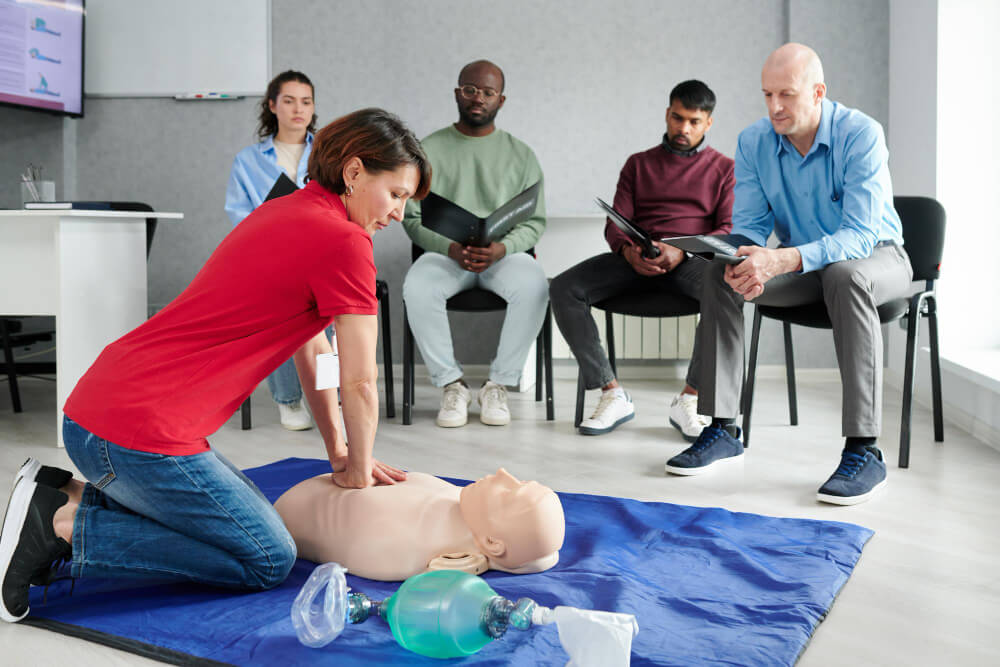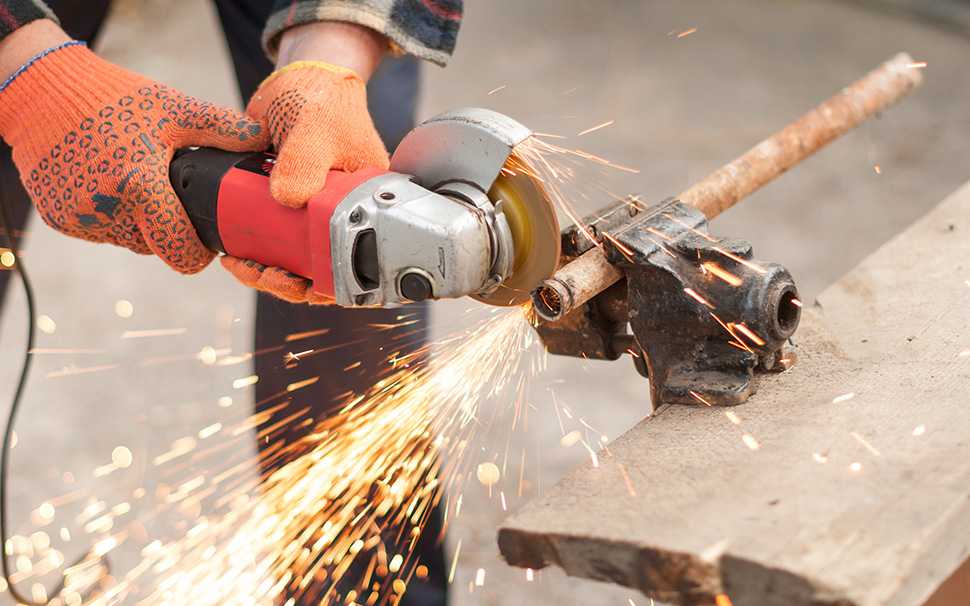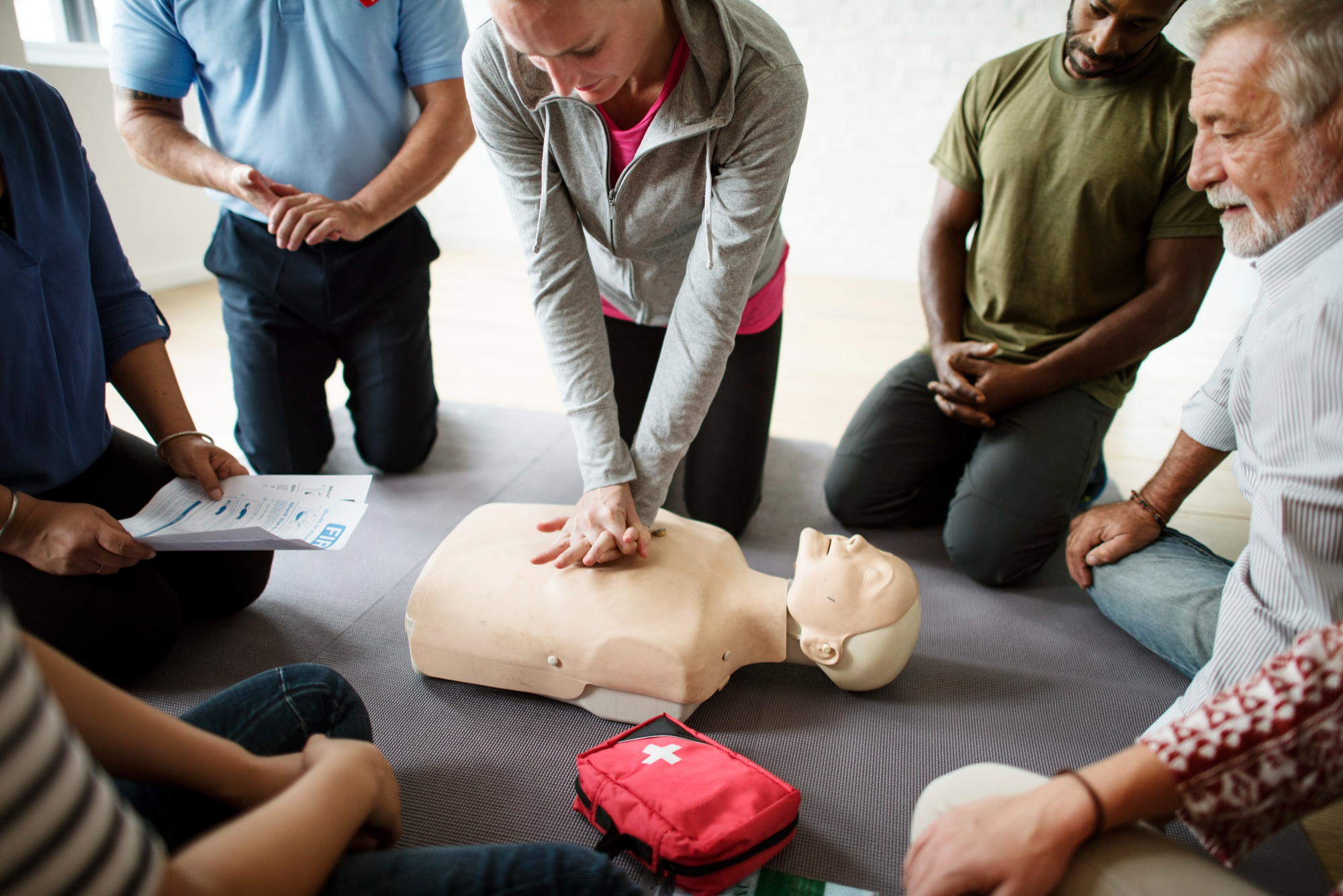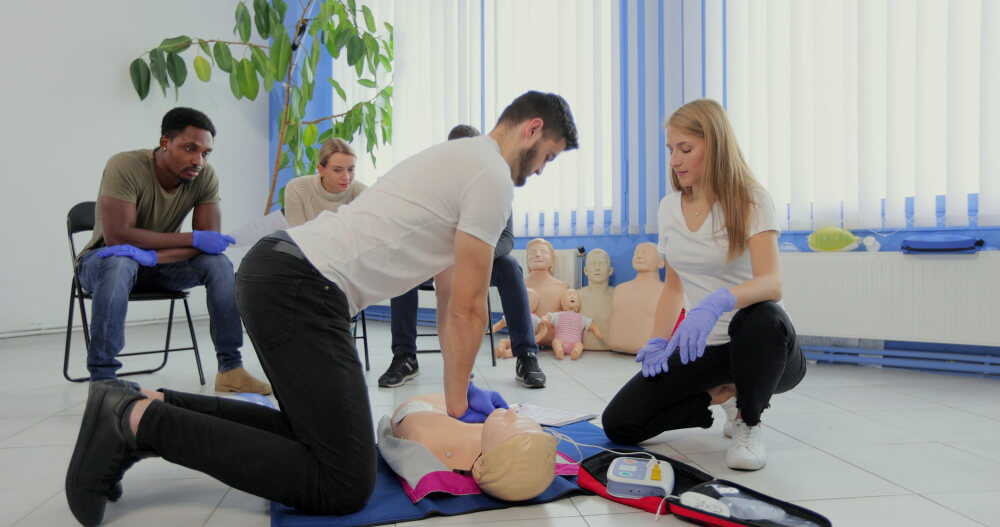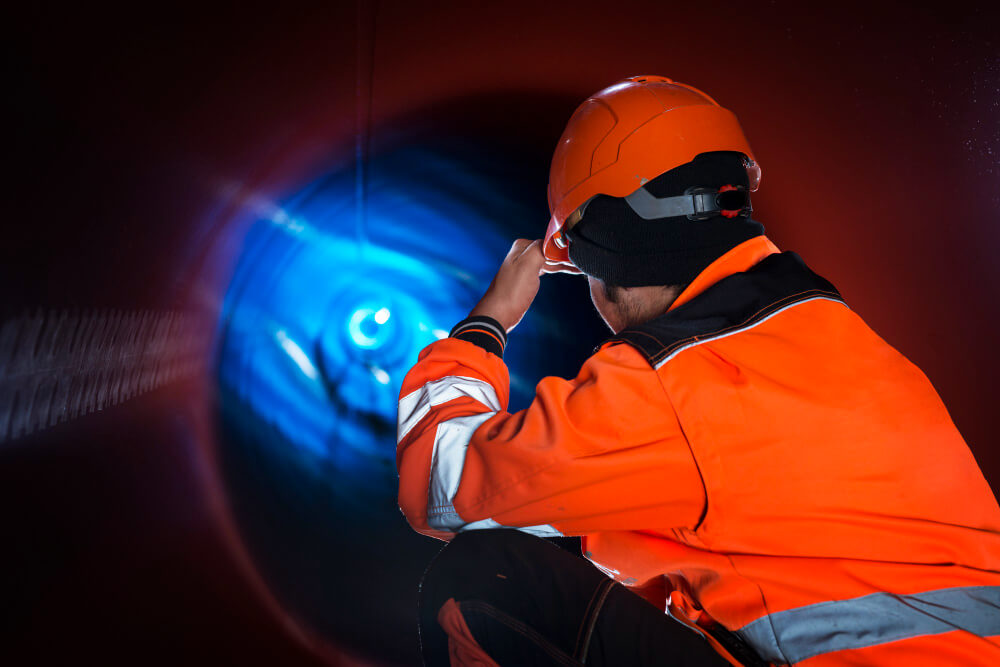First Aid Traning in Ireland for Employers
Whether you run a company with ten or a hundred employees, first aid training is an essential facet of your day-to-day planning. Although requirements vary depending on the size and nature of the organisation, health and safety is important for everyone. Employers should be considering the best possible health and safety provisions for their team, because a healthy workforce is a happy workforce. Employees who feel cared for, and know what to do in case of emergency, will be more productive, happier, and more loyal to their workplace.
What is first aid?
First-aid means either: (a) Treatment in a life-threatening situation (e.g. heart stoppage or severe bleeding) pending medical help, or (b) Treatment for minor injury (e.g. cuts or bruises).
In relation to preserving life, the “chain of survival” concept is recognised. This is based on four vital links to save a life: (i) Early access (ii) Early cardiopulmonary resuscitation (CPR) (iii) Early defibrillation (iv) Early advanced care.
A workplace first aider would be expected to take control of the scene of an incident as the first response after an accident. They would administer immediate care, such as CPR, or tend to minor injuries, for instance using plasters on minor cuts and scrapes. A first aider is not expected to be a medical expert, simply to be able to ascertain the best course of action to follow until a medical expert i.e. a paramedic arrives at the scene.
Why is first aid training important?
While first aid training is a legal requirement, there are many reasons why it is beneficial to have qualified first aiders on your team.
While first aid training is a legal requirement, there are many reasons why it is beneficial to have qualified first aiders on your team.
- It is empowering. A workforce that know they are operating in a safe and legally compliant environment will feel more confident completing their work.
- It is motivating. Employees who feel well cared for and respected will feel more loyal towards their place of work.
- It decreases the risk of accidents. Those who have undertaken first aid training are likely to be very health and safety conscious as a consequence. This should mean that their behaviour creates a culture of care within the workplace, reducing the risk of accidents happening in the first place.
- It creates better outcomes. When accidents happen – which they will – your well trained first aiders will be able to respond quickly and efficiently, improving health outcomes overall. As they will know what to do in the situation, they will treat the casualty in the medically correct way, meaning the chances of long term injury are reduced, and the recovery time improves.
- It saves money. With prompt response to accidents, you will have a healthier workforce, spending less time away from work due to injuries, saving you money on healthcare support, sick pay, and replacement staff.
Legal requirements for first aid training in Ireland
Who do the health and safety laws apply to in Ireland?
Health and safety laws apply to all employers, self-employed people and employees in their workplaces. This includes fixed-term employees and temporary employees.
Laws on health and safety at work
The rights and obligations of both employers and employees in relation to health and safety at work are set out in the Safety, Health and Welfare at Work Act 2005 (as amended). This Act also provides for substantial fines and penalties for any breaches of the health and safety laws.
Many of the specific health and safety laws are set out in the Safety, Health and Welfare at Work (General Application) Regulations 2007- 2020.
Both employees and employers have responsibilities and duties around health and safety at work under these regulations.
Employer’s responsibilities
Employers must ensure their employees’ safety, health and welfare at work, as far as reasonably practicable.
To prevent workplace injuries and ill-health, the employer must:
- Provide and maintain a safe workplace (which uses safe plant and equipment)
- Prevent risks from employees using any article or substance, and from exposure to physical agents, noise and vibration
- Prevent any improper conduct or behaviour likely to put the safety, health and welfare of employees at risk
- Provide instruction and training to employees on health and safety
- Provide protective clothing and equipment to employees
- Appoint a competent person as the organisation’s safety officer
As you can see, a substantial part of the duty of an employer is to ensure that their workforce is properly trained. Under the Safety, Health and Welfare at Work Act, 2005, employers must also allow employees paid time off for safety awareness training. First aid training is one of the most fundamental types of health and safety training, vital to the safe operation of any workplace.
The General Application Regulations 2007
These are made under the Safety, Health and Welfare at Work Act 2005 (No. 10 of 2005). Employers have a duty to provide first-aid equipment at all places of work where working conditions require it. Depending on the size or specific hazards (or both) of the place of work, trained occupational first-aiders must also be provided. Information must be provided to employees or safety representatives (or both) as regards the first-aid facilities and arrangements in place.
Different places of work
Each work place is different, and so there is no one-size-fits-all approach to first aid. Every work activity involves a different set of hazards, and therefore different first aid equipment will be needed. Some places of work (e.g. offices, libraries) have relatively low hazards whereas others (e.g. factories, construction sites) are likely to have a greater degree of hazard, or specific hazards. Requirements will, therefore, depend on several factors including the size of the undertaking, the numbers employed, the hazards arising, access to medical services, dispersal of employees, whether employees are working away from their employer’s premises, and if workers are in isolated locations.
How many first aiders are legally required?
The Regulations require employers and the self-employed to provide, at each place of work under their control, the number (if any) of occupational first aiders as is necessary to deliver first aid at the place of work. They will need to take into account the size and inherent hazards of the workplace. A specific risk assessment should be followed in order to determine the exact number of first aiders needed.
Types of First Aid Training Available
While there are many types of first aid training available, in order to be recognised as a workplace first aid responder, it is important to complete a PHECC certified course. A certificate will be valid for 2 years.
First aid responder beginner
This course covers all the essential basics and enables attendees to become an official workplace first aid responder. On completion of this course, the First Aid Responder will be equipped with the necessary practical skills, knowledge, and confidence to give effective life support, diagnose and treat injuries or illness, and maintain the care and comfort of a patient until the arrival of emergency medical services. This course also includes training in the use of an Automated External Defibrillator (AED) and the skills necessary to perform Cardio-Pulmonary Resuscitation (CPR).
First aid responder refresher
This course is specifically designed for existing First Aid Responders who are required to refresh their first aid skills every two years.
In many instances, these general first aid training courses will suffice. But for some first aiders working with specific hazards, further training for these specialised situations would be recommended. This could include those who are working with dangerous substances completing Chemical Safety Training; or those workplaces with an increased risk of fire sending employees on Fire Warden Training.
Are you looking for first aid training in Cork?
With a plethora of heath and safety training choices available, it can be hard for employers to know which training courses to opt for. ASM Group is a leading provider of safety training in Ireland. We offer health and safety training courses both on a public and private basis nationwide. Our team of experts deliver training courses both online and in-classroom/onsite.
If you need first aid training in Cork, look to ASM Group. Get in touch today.
